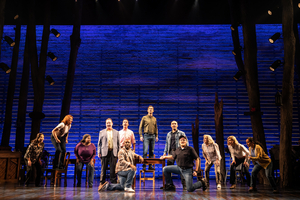Review: COME FROM AWAY Realizes an Unimaginable Event and a Hopeful Destination
COME FROM AWAY welcomes you to Gander, Newfoundland where you will learn about the hopes of human connection amidst a horrific tragedy.

I often think of art as a way to escape reality. Its beauty and wonder can instantly pull me away from my surroundings and seemingly unavoidable situations. I appreciate this unique power that it has, but an element I often forget is that art portrays reality and forces me to confront it. Come From Away, presented by Dallas Summer Musicals, does just that-it takes you away from reality through song, laughter, and the warmth of human connection, and it forces you to confront the reality of the events and societal aftermath of September 11, 2001.
Walking into the beautiful Music Hall at Fair Park, I was able to visit an exhibit with artifacts related to the events of September 11, 2001. Dallas Summer Musicals partnered with George W. Bush Presidential Library and Museum, curated by Amy Hamilton, to bring this meaningful context to the performance of Come From Away. Having these items physically in front of me, one of those items being a book of handwritten notes from Canadian citizens, reminded me of the reality of the story I was about to witness. Yes, it is art, but it is also the truth. The opportunity to interact with these artifacts prior to the performance encouraged me to dive deeper into the characters and their stories.
I don't know much about Gander, Newfoundland, the setting of this true story, but after the opening musical number, "Welcome to the Rock," I felt like I was part of their community. I must admit, when hearing the lyric, "you'll probably understand about half of what we say," I unwillingly let out a nervous laugh, but as a new member of the Gander community, I was able to understand them just fine. Through the lyrics and the characters' interactions while singing this song, the closeness of the citizens of Gander was clear, and it became even more clear throughout the performance.
Shortly after the introductory song, the action began. Gander's citizens were going about their day as usual. The mayor, played by the sensical and funny Kevin Carolan, began his day at Tim Hortons (immediately causing me to crave an Iced Cappuccino), and there was a brief argument regarding the local bus drivers on strike. Disrupting the town's normalcy, Gander's citizens started to hear the news on the radio. This didn't happen all at once; the news spread slowly as each citizen convinced the next to turn on their radio. Each depiction of this moment, a person turning on the radio to hear the horrific news, transported the audience members back to that same moment in 2001. This was a feeling I didn't know I could truly return to, but these believable moments unfolding on stage encouraged and allowed me to do so, once again reminding me of the truth behind this piece of art.
With the focus being on such a horrific, historic moment in the USA, I expected to feel a wide array of emotions throughout the performance, all of which being deep and dark in some fashion; however, I was wrong. Come From Away was upbeat, hilarious, charming, and hopeful, all while giving the audience a glimpse into realities that don't always come to mind when we think of September 11, 2001. There were moments when I couldn't help but smile: drunk plane passengers, "Kiss The Fish" rituals, budding relationships, stolen grills, and very vocal animals. Alongside these bright moments were heartbreaking ones: attempts to locate family members, unwarranted security searches, a confused pilot, and bonds being broken at the end of an eventful few days. These instances of suffering and support were both challenging and uplifting to witness. A community stepped up to help those who needed them. Regardless of language, religion, sexual orientation, or any other element of a person's identity, the community of Gander welcomed the Plane People as if they were neighbors, which for the time being, they were.
The music in Come From Away was an integral part of the storytelling; all of the songs were perfectly placed and incredibly impactful. I was instantly in awe by the beautiful sounds of "28 Hours/Wherever We Are" and shocked by the realization that some passengers were on their planes for more than one day, but it wasn't long before this musical number had the audience chuckling at the passengers drunkenly interacting on their flight. Lyrics alone couldn't have created the same impact; the movements of the actors were what brought the songs to life. When singing "On The Bus," the performers were able to slightly jolt their bodies around as if they were actually leaving the airport on a bus. The physical liveliness of the performers during "In The Bar/Heave Away" allowed the audience to witness characters forming bonds and investing themselves in the humanity of this horrible situation. There were two songs that struck me as most powerful-"On The Edge" and "Me and the Sky." The Company sang "On The Edge," depicting the honest, and sometimes unfair, feelings of grief and frustration from the passengers. It was a despairing and grim song that somehow still evoked a feeling of hope from the audience. Marika Aubrey and the Female Company performed "Me and the Sky." This moment, learning the nuance of Beverly's, the passionate female pilot played by Aubrey, hopes and dreams and knowing how they came to an unexpected halt, was incredibly powerful. Among these few songs were many others that communicated raw emotion. Supplementing these beautiful lyrics and voices was skillful acting.
In many scripts, one actor plays one character. This is not the case in Come From Away. Each member of the cast acts as an individual, yet each individual can shift to be someone else or a part of a larger whole at any given moment. Actors were seamlessly transitioning from one role to another through the use of costumes and small props, like the quick addition or removal of a hat, the illumination of one's face with a flashlight, or a significant shift in accent. It was amazing how these performers could become a new character in a single instant. Each role was believable. When an actor would make any small change to their costume or persona, that was exactly who they were. There was no hint of the characters they had previously portrayed. It was truly incredible, and if someone had told me about these artful character shifts ahead of time, I don't think I would have been able to understand how masterful it really was. I needed to see it for myself.
Every character had at least one moment that touched my heart or funny bone, the most significant being Bonnie, Beverly, Janice, Hannah, Ali, and Beulah. A thoughtful, determined Bonnie, played by the fiery Sharone Sayegh, brought tenderness and laughter to the audience each time she graced the stage. Marika Aubrey's character, Beverly, was not only brilliant while singing but was also motivating to all girls and women in the audience. Julia Knitel's portrayal of Janice was raw and relatable as she emphasized Janice's excitement for a new opportunity and her struggle to cope with an unimaginable situation. A woman longing for answers, Hannah, played by the motherly Danielle K. Thomas, made phone call after phone call, highlighting the reality of how many souls were missing or lost. Ali, a character so incredibly important to the message of this performance, was played by Nick Duckart, who forced the audience to witness and acknowledge the unfairness and prejudice that followed, and still follows, September 11, 2001. Then there was Beulah, charmingly played by Julie Johnson, who showed kindness to everyone, including Ali, even when everyone else was afraid to do so. Each cast member was necessary to the authenticity of this story, and as they transitioned from role to role, I became deeply invested in the struggles and connections that were present in Gander, Newfoundland in 2001.
Come From Away has one of the best uses of stage elements that I have ever witnessed. The set itself was intriguing. There were large trees surrounding the stage, implying the woodsy atmosphere of Gander, Newfoundland. The band was on stage and slightly visible, and they were incredible! Oftentimes musicians are tucked away, but these talented musicians made their presence known, and the audience loved it. One of the most exceptional parts of the visual aesthetic was the various use of lights. The implementation of spotlights and projections was artistic and effective. As various musical numbers and scenes occurred throughout the performance, the characters introduced, repositioned, and removed props in a way that looked completely natural. Their movements were choreographed perfectly, like that of a graceful dance, which allowed for the action of the performance to propel forward without the audience ever noticing a transition. These simultaneous stylistic elements brought the characters and their stories to life, along with their frequently changing wardrobes.
Come From Away is a show that can appeal to everyone, whether you are searching for a skillful use of stage elements, enchanting voices, or a meaningful message, and if you are hoping for all three, it is the perfect show for you. It uses art to tell the truth-a frightening truth of terroristic acts and a hopeful truth of human connection. The citizens of Gander said, "you would do it for us," whenever a member of the Plane People would thank them for their comfort and community. This small, yet impactful statement begged us audience members to consider the question, "would I do it for them?"
I encourage you to go see this artful musical full of confusion, despair, hope, and connection, and use it to confront your own truth-what would you do to support someone in need, regardless of who they are? Think about the Plane People and the citizens of Gander, Newfoundland, and use their stories to ignite your fire for helping others.
Details:
Music Hall at Fair Park March 8-March 20. Purchase tickets through the Dallas Summer Musicals website.
Photo Credit: Matthew Murphy
Reader Reviews



 The Rock Scenic Unisex Tee
The Rock Scenic Unisex Tee Come From Away Yellow Islander Hat
Come From Away Yellow Islander Hat Come From Away Broadway Logo Unisex Tee
Come From Away Broadway Logo Unisex Tee Come From Away Kissed the Cod Mask
Come From Away Kissed the Cod Mask